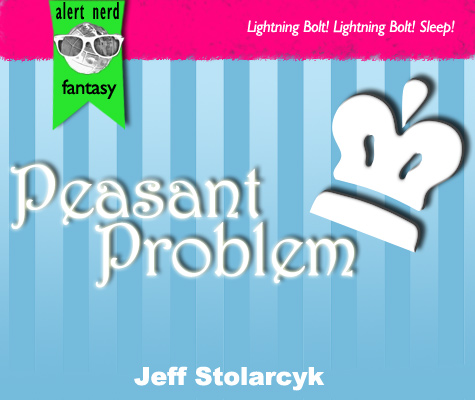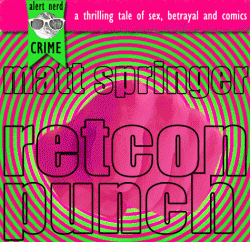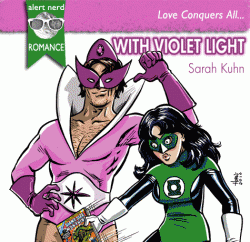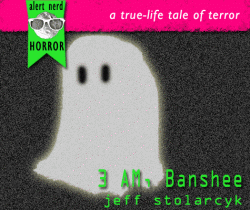Sarah and Jeff BS About Teen Romance
Sarah and Jeff BS About Teen Romance
Oct 01
Sarah likes to read books about kick-ass teenage girls and supernatural shenanigans and swirly-eyed romance. Jeff is starting to enjoy some of these books, too. Recently, they had a long, rambling conversation about why these books — and romance in general — make them feel so special inside and how that relates to geekdom at large.
Sarah: Okay, Jeff, are we talkin’ teen romance or, like, all romance? And does this mean you’re admitting you’re just a big teenage girl on the inside?
Jeff: First off, I think we all know that I’m a big teenage girl on the inside. A six-and-a-half foot tall, tie and hat wearing, linebacker-sized 16-year-old girl. I mean, come on, my favorite currently airing TV shows are Gossip Girl and Glee.
Um, Go Steelers?
Anyway, I haven’t read any legit adult romance, with the ripply chest muscle covers and the “Baron Utz’s daughter Marzipan was an innocent virgin stolen away on the waves by the pirate captain Jet — a sea dog known for his sharp sword and legendary stamina….” back cover text. I have read teen romance, though. Most recently, I actually took the plunge on Melissa Marr after hearing so much praise for her work from so many people whose opinions I pay attention to, and I really tore through Wicked Lovely and Ink Exchange.
I think that, on an emotional level at least, romance is romance. Probably because whether you’re a pillaged pirate princess, a fairy queen, or a 30-year-old over-literate nerdy guy, romance’s job — both in prose form and the real world kind — is kinda to make you feel like a teenager again.
Sarah: Well, when I say “romance,” I don’t mean the ripply-chested romance genre so much as “romance as a part of stories we enjoy.” Like the Sookie Stackhouse books — the characters aren’t teenagers and they’re not classified as YA, but there’s enough romance within to satisfy our inner teen girls.
Melissa Marr’s books are fantastic — and I’ve said this before, but one of the things I love about them is they are deeply, unapologetically romantic. They take me back to being 13 and shipping Troi/Riker or whatever. In fact, come to think of it, a lot of my geek touchstones seem to revolve around people making out or getting it on or having A Moment. Which is interesting, cause I feel like nerd culture looks down on the idea of “romance,” in a way. Maybe because the word conjures a ripply chest image?
Jeff: Geek culture does look down its nose at it a bit. At least in public. I wonder if it isn’t just armor. I mean, John Hughes taught the nerds of our generation that we don’t really get the girl; Molly Ringwald’s going to make out with that other guy while we’re stuck being the best friend. By the time I finished high school, I know that I had my heart stomped on so many times that I’d rather act like a bitter cynic.
Just the other night, I was having dinner with a friend, and she seemed positively shocked when I told her that Casablanca was my favorite movie. Which I suppose is a weird choice considering I own a replica lightsaber. On the surface, there’s certainly a dissonance between the kind of stuff our culture embraces and the concept of romantic love. I mean, gorillas, robots, light cycles and TIE fighters aren’t awesome because they tug on your heart strings (unless the gorilla is crying, in which case those strings totally get pulled).
But that’s just a superficial reading. We need emotional impact just as much as we crave big action; they are equal parts in the geek-out recipe. I mean, my favorite moment in Matt Fraction’s Iron Man run so far wasn’t Tony laying a beating down on Zeke Stane or Pepper’s total ownage of Madame Masque, but the panel where Tony asks, “Who’s Happy?” That’s a heartbreaker. I nearly cried.
The comic booky, sci-fi trappings don’t mean anything if there isn’t a heart beating underneath it, you know? There’s a bit of Rick and Ilsa in Han and Leia, Mal and Inara, Kirk and Spock, Jean and Logan, and even Bones and Booth if you want to get all procedural about it.
As for Sookie Stackhouse, I think the books are a spot-on externalization of the kind of high school love experience — a roller coaster of falling in love and being betrayed and falling in love and being betrayed and then there’s a guy who turns into a tiger. You even have poor, marginalized Sam, who’s basically a shapeshiftery Brian Krakow.
Sarah: Well, I don’t know that John Hughes movies give any more hope to nerdy ladies — I mean, try as I might, I never encountered a chambray-shirted Eric Stoltz prowling the halls of my high school, all ready to shove the Amanda Joneses of the world aside for a chance with the weird girl who likes Star Wars.
I think the disconnect you’re describing is totally fascinating and I think it gets even stranger and more disconnected-y than that, because a lot of times, the most passionate segments of fandom are the ‘shippers — so much so that that’s become one of the easiest portions of geekdom for other geeks to make fun of. But the romances and would-be romances are what give the story that beating heart you’re describing. So, listen, geeks — embrace your inner ‘shipper! It’s really okay!
That brings us back a little to the books we were initially talking about, wherein the romance is really a huge part of the storyline. I dig that — anything that crosses geeky sci-fi/fantasy stuff with super-lurve has my name stamped all over it. And I’m trying to remember if that’s always been the case. I guess it has, sort of, but when I was actually a teenager, I didn’t really like stories with teenagers in them. Like, I was all about the romance in Anne McCaffrey’s Dragonriders of Pern series, but would I have also read Melissa Marr and The Hunger Games? I don’t know. I think I enjoy them so much now because — I mean, largely because they’re amazing stories, but also, I like connecting with that hopelessly romantic, teenage part of myself. Whereas when I was an actual teenager, it was a little too close to home. Does that make sense?
Jeff: It absolutely makes sense. There’s a line in Jonathan Hickman’s The Nightly News that sticks in my head thinking about this — something to the effect of, “the most important lesson you should learn in school is that you don’t belong.â€
Reading YA fiction now, I’m cognizant of how much the characters were me, but when I read any of it when I was younger, the perspective I gained from it was that I was everybody — that there were other people whose problems were So Important and who never had anything go their way. More eloquently, I figured out that everybody was a misfit, and coming back to the genre, I realized how normal I was. I think those are very different and very valuable lessons
As to how I’d receive books like The Hunger Games, I know that I probably never would have touched The Hunger Games when I was an actual teen. Probably because my friends would mock me for reading a “girl book.” But also because I was already reading “adult” lit by that time — and of course, by adult lit, I mean licensed genre fiction, hence the sarcastiquotes.
The other thing that’s different now, though, is that the entire YA field has been anointed by proxy because of Twilight.
Sarah: I think it was Harry Potter, actually, that really started the whole “many, many adults reading books marked for a younger bracket” thing. Twilight has gotten a lot of folks to look at some of the stuff that’s more explicitely romance-y, I suppose.
Here’s something that interests me, though: is Hunger Games really a “girl” book? I mean, I’m assuming your dopey friends would just be going by the cover here and wouldn’t have read the actual book, and the cover — to me — doesn’t convey “girly” the way Twilight‘s swirly font and pretty apple do.
Okay, but then…say we’re not going by the cover, but are also talking about the actual content. Is it a “girl” book? And what does that mean?
Jeff: No, I don’t think it’s a “girl” book. I think that my dopey high school friends would see a book 1) by a girl and 2) about a girl and react negatively to it. I think that still matters to young nerd males. In bookstores, YA is expressly aimed at a female market and it’s tough, at 14 or 15, to step across that imaginary line.
But Hunger, in specific? Is it girly? No, the mockingjay isn’t expressly feminine — it’s actually a bit badass, isn’t it? And the content of the book — even though it’s certainly about a girl — isn’t all proms and scrapbooks. It’s the utter opposite. As a lot of nerddom points out, it has way more similarities to Battle Royale than it does to, say, Wicked Lovely.
One of the things that I’ve been doing with my “chick lit†reading list this year is kind of deprogramming myself from the expectation that there are these huge differences between literature aimed at one gender over the other. Bridget Jones is Rob Fleming is Cannie Shapiro is Edward Cullen. It doesn’t matter if your thing is weighing yourself obsessively or top five lists or freesias, those are just indicative of the fact that we’re all broken and that everybody can be a geek about something.
Sarah: Okay, that makes sense. I think I was wondering about the “girly” issue because someone left a comment on one of our other posts about Hunger Games being a “Twilight-fied version of Battle Royale.” And I had to think about that for like ten minutes, because of course I see Battle Royale…but Twilight? Is it because there’s a girl and two dudes and, like, lovey stuff? I don’t quite see it, and I think it reminds me of that thing you know I hate, that thing where a lot of books by ladies get painted with a dismissive “chick lit” brush and that’s that. Or, to use another example, that thing where so many geeks turn their noses up at something like Gossip Girl just because it’s, you know, called Gossip Girl. I keep saying: I love Gossip Girl for the same reasons I love genre stuff. Larger-than-life characters undone by perfectly human emotions.
But anyway, I love what you’re saying in your last paragraph there and I wish more people would think that way rather than setting up these imaginary walls between Us and Them. Because geeks — the most likely outcasts — do it more than anyone. I mean, regardless of what you think about Twilight, the brouhaha over the Twilighters “ruining” Comic-Con this year is maybe the dumbest thing I’ve ever heard. Those girls are fans — just like you, asshole*. They belong there more than all the weird, random panels for non-genre TV shows. And if I get to kick someone out of Comic-Con, it sure ain’t gonna be them.
*I’m not calling you an asshole, Jeff. Just, you know, the “Twilight ruined CC” people. In fact, your neck kind of smells like freesia today. New cologne?
Jeff: The packaging said that it was Bella’s favorite, so I figured I’d give it a spin.
I may be the asshole; I’ve read the Twilight books and really can’t find much to like about the series. I may have written a blog post that called Twilight “the death of art,” at one point. And by may have, I mean that I did. The funny thing is that out of the 20-some comments on that post, only a handful are not from teen girls cheering my little hatecapade on.
My counterpoint on the phenomenon that is Twilight is this: back before Twilight was A Thing, a student told me to read the books because they “changed her life.” I can only imagine how, and I feel very sorry for the girl now that I’ve read the saga myself. But she became a more engaged reader. She became a more engaging writer. Because of those books. And I can heap all the crap on them that I like, but they’ve done at least one good thing.
I mean, I guess what I’m saying is that there are plenty of reasons to not like a thing, but bringing new blood into the clubhouse shouldn’t be one of them.
Sarah: Okay, but Jeff…I prefaced that with “regardless of what you think about Twilight.” Cause Twilight itself has been talked to death and I don’t think this is so much a “is Twilight good or not?” discussion. So no, still not an asshole.
I do think we shouldn’t really judge what does or does not change someone’s life as a nerd. I mean, I see a lot of “oh, no, now girls are going to have effed up ideas about love!” Well, um. The guys I liked when I was Bella’s age? Not exactly sterling examples of young manhood. I grew out of it. I would not take romantic advice from Bella. I would also not take romantic advice from Buffy Summers, Jean Grey, or pretty much any fictional character I like even a little bit, because most of them are not very smart when it comes to such things. Or, you know, they have Issues.
But the more important point is that hating on someone for being a fan and anointing yourself as the person who gets to decide who does and does not get to enter the clubhouse is the real dick move.
We can all smell like freesia together. For reals.
Jeff: That would be nice. Unless you’re allergic to freesia.










Sarah, you say two awesome things here that I think need to be said more often:
“I mean, I see a lot of “oh, no, now girls are going to have effed up ideas about love!†Well, um. The guys I liked when I was Bella’s age? Not exactly sterling examples of young manhood. I grew out of it.”
Yes. People are stupid. People will always be stupid. A book does not influence people to make the wrong decisions.
And:
“But the more important point is that hating on someone for being a fan and anointing yourself as the person who gets to decide who and who does not get to enter the clubhouse is the real dick move.”
I had to stop reading the Internets during SDCC because I wanted to throttle every asshole who complained about the TWILIGHT fans “ruining Comic Con.” As Jeff might say, STFU nerds. Jesus. If anyone should be supporting TWILIGHT fans, it’s members of other fandoms.
Wow, this is a really interesting discussion. First of all, I haven’t read any of the YA books you guys are talking about (though now I think maybe I should) — and I’m somebody who kind of missed a lot of YA the first time around, because I went straight from Lloyd Alexander and ‘The Baby-Sitters Club’ (which might be YA if they were published now but I think were considered Juvenile in the 80s/early 90s?) to Jane Austen and Thomas Hardy. WAY too much Hardy in retrospect; I didn’t even LIKE those books, I have no idea. (Also, I read a whole bunch of Sweet Valley High but I tend to act like that didn’t happen).
Anyway, it’s funny because I tend to be a ‘shipper and I like my genre stories with romance *in* them, but I’m generally wary of stories that are framed as romance. Because, I think — and really this is completely my personal issue — most of the time I’m introduced to a character’s story and I don’t see romance as a solution to the problem they’re having. I like Scott and Jean in large part because they want to be together but other stuff — other responsibilities, other threats and conflicts — keep getting in their way. ‘Dark Phoenix Saga,’ despite all its baggage, is powerful and tragic because they’re in love but it’s not enough. Possibly I’m a bit of a fatalist ;).
“Pride & Prejudice” is my favorite happy-ending love story because the marriage really does solve the problem, and because Darcy & Elizabeth getting together really does make both of them better without hurting anyone else (who doesn’t deserve to be hurt). The best love story I’ve read recently is, of all things, Brian Bendis’s “Jinx.” Which is distinctly not YA. So I’m just rambling and not really addressing your conversation — but it’s a very interesting one. And I love how Jeff slipped Kirk/Spock in there.
Jeff — interesting that view the YA market as aimed expressly toward young women. I have come to believe that a lot of fiction is aimed at women at any age level.
As a teen librarian I sometimes find it a challenge to find new, good fiction aimed at guys, but I think that’s been steadily improving. In fact, the quality and quantity of YA fiction has been exploding over the past decade.
There are now lots of great male authors writing for guys in the YA world. They just haven’t received the level of attention that Stephenie Meyer has garnered — but, then again, who has?
Some of my favorite guy YA authors are John Green, Scott Westerfeld, MT Anderson, Walter Dean Myers, and Markus Zusak.
And though I haven’t read his books, depending on the success or failure of the Cirque du Freak movie starring John C. Reilly you could see author Darren Shan become even more popular (he’s already extremely popular with the middle school boy crowd).
Sorry for the digression. YA fiction is something I can talk about forever.
Re: critiques of Twilight and stalkeriness, I think it depends on the context. If you’re a reader who is willing to accept all kinds of sexist assumptions but uses ‘Twilight is a stalker book’ as a reason to dismiss it without reading it, that’s not on. But I think critiquing the messages in the story is legitimate if it’s done with the right intent. I mean, I’ve had the same conversation about ‘Jane Eyre’, I don’t really think Stephenie Meyer should be immune.
Caroline: Oh, sure, I’ve read a lot of great critiques of the stalkery message in Twilight. I’m totally for intelligent discussion of that sort of thing. I think it just bugs me when people sort of roll their eyes dismissively/condescendingly and are like, “man, these girls are gonna have such terrible ideas about relationships!” Riiiiiight…cause I developed a lot of *fantastic* ideas about relationships watching Spike and Buffy go back and forth and that is now what I base all of my relationship-related choices on. Come on, now! Love all your comments about shippiness, btw 🙂
And thanks, Dan!
I thought ‘Gone With the Wind’ was verrah romantic as a teenager. I got over it — though I still like the characters (and Rhett, a bit, in spite of myself) . (the politics and history are another can of worms, of course).
Also, it’s probably true that just because some stories happen to reinforce bad ideas about relationships, there’s not necessarily a cause and effect. I think we’re just as likely to forgive a sketchy character because he reminds us of an equally sketchy boyfriend, as much as vice versa.
Kelly,
I will have to check some of those out. I’ve heard of Darren Shan and also of Westerfield, so maybe I’m wrong. I also, though I haven’t ready any of it, have heard decent things about Jude Watson’s YA Star Wars stuff.
Kelly: howzabout Patrick Ness? 🙂
Sarah: Yes! Patrick Ness’ Chaos Walking Trilogy is great so far.
And, Jeff, I hate to be the one to break it to you, but Jude Watson is a pseudonym used by writer Judy Blundell. She is incredibly prolific (has written well over 100 books), but has only published one book under her own name. That book, What I Saw and How I Lied, won the 2008 National Book Award for Young People’s Literature. She is still most famous for her Star Wars prequels. Just proves your point that guys probably are less likely to pick up a “guy” book written by someone named Judy. 🙂
Kelly, I knew Jude Watson was a woman. I didn’t mean to group her in with Shan and Westerfield because I thought they were all men, but because their work (at least in terms of the Star Wars stuff) was male-slanting.
Jeff — I didn’t know Jude Watson was a woman until Judy Blundell won the Nat’l Book Award. 🙂 I assumed Jude was a dude!
How did I manage to miss such an amazing post?
bad smuggler.